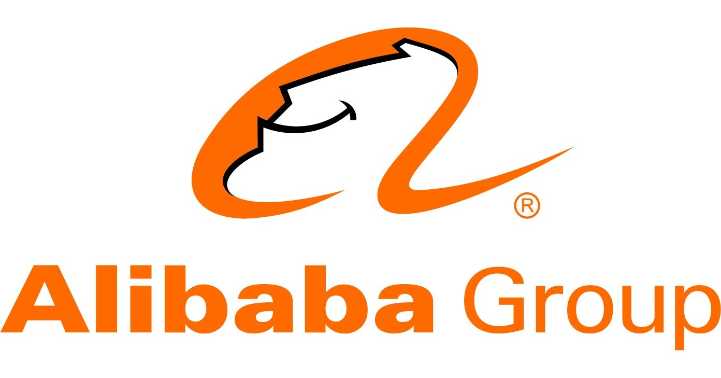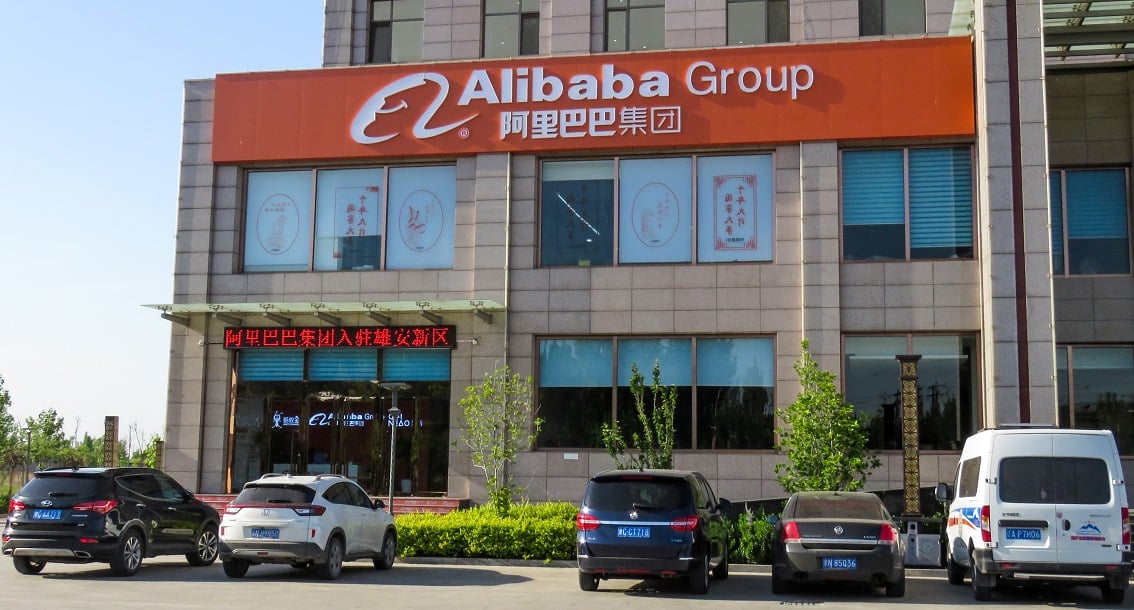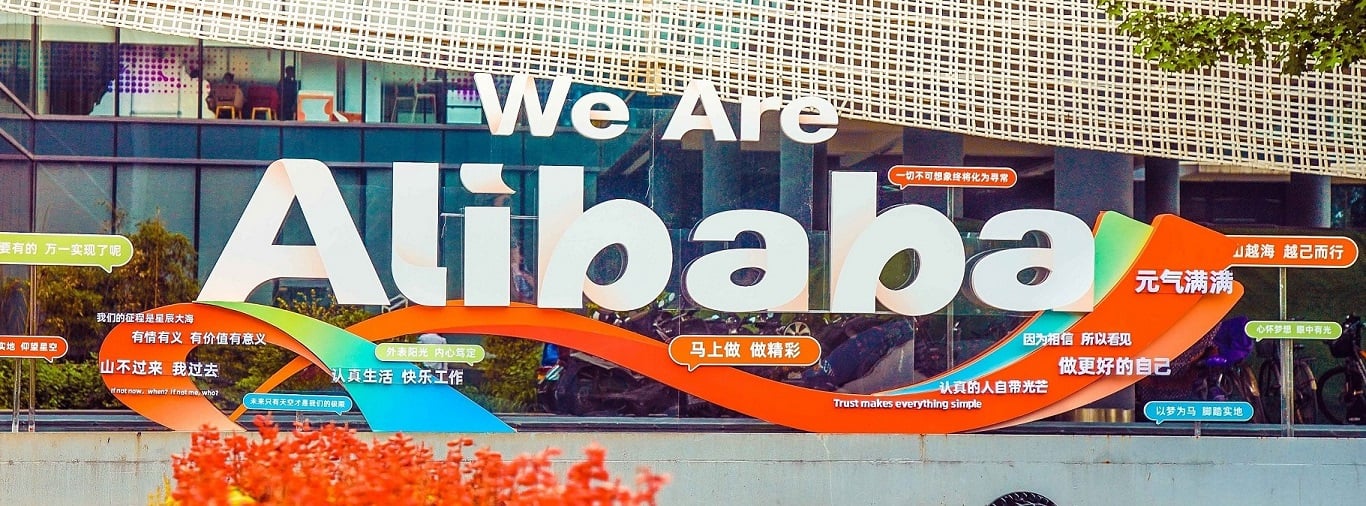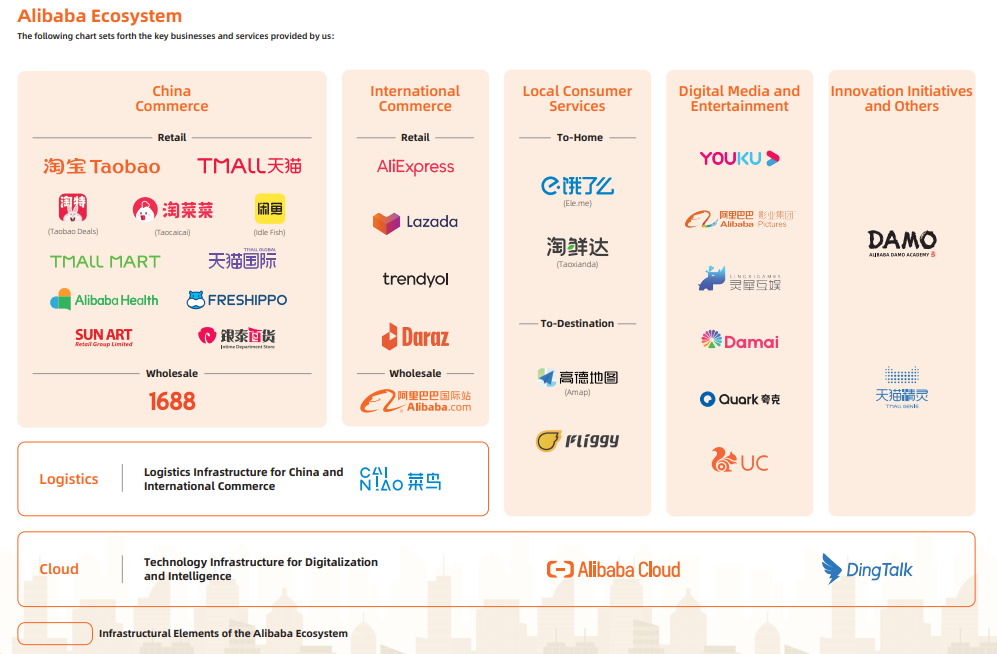Alibaba Group Holding
Summary
- Alibaba Group Holding Limited (BABA) is a Cayman Islands holding company.
- The company conduct its business in China through its subsidiaries and variable interest entities

Alibaba Group Holding Limited (NYSE:BABA, HKEX:9988) is a Cayman Islands holding company established under the Companies Law of the Cayman Islands (as amended) on June 28, 1999, and the company conduct its business in China through its subsidiaries and variable interest entities.
Recent developments
Alibaba Group Pursues Primary Listing on the Hong Kong Stock Exchange1
July 26, 2022 - Alibaba Group Holding Limited announces that its board of directors has authorized the Company’s management to apply for a primary listing on the Main Board of Hong Kong Stock Exchange. After completion of the primary listing process, which is expected to occur prior to the end of 2022, Alibaba will become a dual-primary listed company on the New York Stock Exchange in the form of American Depositary Shares (“ADSs”) and on the Hong Kong Stock Exchange in the form of ordinary shares.
Alibaba currently maintains a secondary listing on the Main Board of Hong Kong Stock Exchange and will apply for a primary listing status pursuant to the rules and regulations of the Hong Kong Stock Exchange. The Company's ADSs listed in the United States and the shares listed in Hong Kong are fungible, and investors can continue to choose to hold their shares in the form of ADSs traded on the New York Stock Exchange or ordinary shares traded on the Hong Kong Stock Exchange.

Financial Highlights
June Quarter 2022 Result
Alibaba Group Holding Limited announced its financial results for the quarter ended June 30, 2022.2
Revenue was RMB205,555 million (US$30,689 million) and remained stable year-over-year primarily due to a decline in China commerce segment revenue by 1% year-over-year to RMB141,935 million (US$21,190 million) offset by revenue growth of Cloud segment by 10% year-over-year to RMB17,685 million (US$2,640 million).
Income from operations was RMB24,943 million (US$3,724 million), a decrease of 19% year-over-year. Adjusted EBITA, a non-GAAP measurement, decreased 18% year-over-year to RMB34,419 million (US$5,139 million).
Net income attributable to ordinary shareholders was RMB22,739 million (US$3,395 million) and net income was RMB20,298 million (US$3,030 million). Non-GAAP net income was RMB30,252 million (US$4,517 million), a decrease of 30% year-over-year, mainly due to a decrease in adjusted EBITA and a decrease in share of results of equity method investees.
Diluted earnings per ADS was RMB8.51 (US$1.27) and diluted earnings per share was RMB1.06 (US$0.16 or HK$1.24). Non-GAAP diluted earnings per ADS was RMB11.73 (US$1.75), a decrease of 29% year-over-year and non-GAAP diluted earnings per share was RMB1.47 (US$0.22 or HK$1.72), a decrease of 29% year-over-year.
Net cash provided by operating activities was RMB33,869 million (US$5,057 million), an increase of 1% compared to RMB33,603 million in the same quarter of 2021. Free cash flow, a non-GAAP measurement of liquidity, was RMB22,173 million (US$3,310 million), an increase of 7% compared to RMB20,683 million in the same quarter of 2021.

Business Overview
China Commerce
China commerce segment mainly includes its China commerce retail businesses such as Taobao, Tmall, Taobao Deals, Taocaicai, Freshippo, Tmall Supermarket, Sun Art, Tmall Global and Alibaba Health, as well as wholesale businesses including 1688.com.
For the quarter ended June 30, 2022, online physical goods GMV generated on Taobao and Tmall, excluding unpaid orders, declined mid-single-digit year-over-year mainly due to impacts from COVID-19 resurgence and restrictions that resulted in supply chain and logistics disruptions in April and most of May. In late May, as logistics capacity normalized, the company saw recovering GMV driven by a successful 6.18 Shopping Festival that was strongly supported by its merchants and loyal consumers. The 6.18 Shopping Festival achieved positive paid GMV growth year-over-year and the company saw especially strong purchasing demands from its 88VIP members.
International Commerce
International Commerce Retail
The company's international commerce retail businesses include Lazada, AliExpress, Trendyol and Daraz. During the June quarter, the combined number of orders of Lazada, AliExpress, Trendyol and Daraz declined by 4% year-over-year, primarily driven by declining orders of AliExpress due to change in the European Union's VAT rules, depreciation of the Euro against the U.S dollar as well as ongoing supply chain and logistics disruptions due to the Russia-Ukraine conflict.
In Southeast Asia, Lazada exhibited healthy order growth of 10% year-over-year during the quarter ended June 30, 2022. Year-over-year order growth decelerated due to shopping activities normalizing back to offline channels with the lifting of COVID-19 restrictions in the region. Lazada has continued to focus on improving operating efficiency, which has resulted in narrowing of losses quarter-over-quarter and year-over-year during the quarter ended June 30, 2022.
During the June quarter, overall orders of Trendyol grew 46% year-over-year. To better serve its significant consumer base, Trendyol has continued to invest and expand into high-frequency local consumer services business. As of June 30, 2022, Trendyol served more than 225 thousand merchants on its marketplace platform.
International Commerce Wholesale
During the June quarter, international commerce wholesale revenue grew 12% year-over-year. Value of transactions completed on Alibaba.com grew 16% year-over-year, driven by solid growth in industrial goods, partly offset by weakening demand of consumer products from sourcing customers in key developed countries challenged by supply chain disruptions and increasing retail channel inventory build-up.
Local Consumer Services
Local consumer services segment includes “To-Home” and “To-Destination” businesses. For the quarter ended June 30, 2022, Local consumer services order volume declined by 5% year-over-year mainly due to declining Ele.me restaurant delivery orders, impacted by COVID-19 resurgence and restrictive measures, partly offset by solid growth of Ele.me non-restaurant delivery orders and strong growth of Amap orders. During the quarter, overall segment GMV declined year-over-year but has improved each month as COVID19 impacts eased. Overall segment GMV growth turned positive in the month of June 2022.
Cainiao
In the quarter ended June 30, 2022, revenue from Cainiao, before inter-segment elimination, grew 7% year-over-year to RMB17,292 million (US$2,582 million), primarily driven by the growth of fulfillment solutions and value-added services provided to its China commerce retail businesses, partly offset by declining revenue from merchants of its international commerce retail businesses. During the quarter, 70% of Cainiao's total revenue was generated from external customers. Revenue from Cainiao, after inter-segment elimination, grew 5% year-over-year to RMB12,142 million (US$1,813 million).
Cainiao continues to expand its international logistics network by strengthening its end-to-end logistics capabilities, including eHubs, line-haul, sorting centers and last-mile network. In July 2022, Cainiao commenced operation of a new international sorting center in Israel, bringing the number of overseas sorting centers in operation to ten. Cainiao is also building and investing in capabilities to improve delivery experience for its global consumers and enrich its value proposition to cross-border merchants. For example, during the quarter, the company increased smart lockers capacity and made a bolt-on acquisition that enhanced its last mile delivery capability in Europe. As of June 30, 2022, Cainiao had more than 7,700 smart lockers in operation in Europe.
In China, Cainiao continues to expand its value-added services, including door-step parcel delivery service, through Cainiao Post to improve consumer experience, which complements its China commerce businesses. As of June 30, 2022, excluding those in rural areas and universities, approximately 70% of Cainiao Posts offer door-step parcel delivery service to consumers.
Cloud
The company's Cloud segment is comprised of Alibaba Cloud and DingTalk. For the quarter ended June 30, 2022, total revenue from its Cloud segment before inter-segment elimination, which includes revenue from services provided to other Alibaba businesses, was RMB23,938 million (US$3,574 million). Revenue after inter-segment elimination was RMB17,685 million (US$2,640 million) for the quarter ended June 30, 2022, an increase of 10% year-over-year. Year-over-year revenue growth of its Cloud segment reflected recovering growth of overall non-Internet industries, driven by financial services, public services, and telecommunication industries, partly offset by decline in revenue from the top Internet customer that has gradually stopped using its overseas cloud services for its international business due to non-product related requirements, online education customers as well as softening demand from other customers in China's Internet industry. For the quarter ended June 30, 2022, after inter-segment elimination, non-Internet industries contributed 53% of Cloud revenue, up more than five percentage points compared to the same quarter last year.
Company Overview
Alibaba Group Holding Limited (BABA) is a Cayman Islands holding company established under the Companies Law of the Cayman Islands (as amended) on June 28, 1999, and the company conduct its business in China through its subsidiaries and variable interest entities. The company's ADSs are listed on the NYSE under the symbol "BABA."
The company's significant subsidiaries, as that term is defined under Section 1-02 of Regulation S-X under the Securities Act, include the following entities:
- Taobao Holding Limited, an exempted company incorporated with limited liability under the laws of the Cayman Islands, which is its wholly-owned subsidiary and the indirect holding company of the PRC subsidiaries relating to Taobao Marketplace and Tmall.
- Taobao China Holding Limited, a Hong Kong limited liability company, which is the direct wholly-owned subsidiary of Taobao Holding Limited and the direct holding company of the PRC subsidiaries relating to Taobao Marketplace and Tmall and operating entity for the overseas business of Taobao Marketplace and Tmall Global.
- Taobao (China) Software Co., Ltd., a limited liability company incorporated under the laws of the PRC, which is an indirect subsidiary of Taobao Holding Limited and a wholly-foreign owned enterprise, and provides software and technology services for Taobao Marketplace.
- Zhejiang Tmall Technology Co., Ltd., a limited liability company incorporated under the laws of the PRC, which is an indirect subsidiary of Taobao Holding Limited and a wholly-foreign owned enterprise, and provides software and technology services for Tmall.
- Alibaba.com Limited, an exempted company incorporated with limited liability under the laws of the Cayman Islands, which is its wholly-owned subsidiary and the indirect holding company of the PRC subsidiaries relating to Alibaba.com, 1688.com and AliExpress.
- Alibaba.com Investment Holding Limited, a company incorporated with limited liability under the laws of the British Virgin Islands, which is the direct wholly-owned subsidiary of Alibaba.com Limited and a lower level holding company of the PRC subsidiaries relating to Alibaba.com, 1688.com and AliExpress.
- Alibaba Investment Limited, a company incorporated with limited liability under the laws of the British Virgin Islands, which is its wholly-owned subsidiary and the principal holding company for its strategic investments, including Youku Tudou.
The Alibaba Ecosystem

Locations
| Asia Pacific | Europe and Middle East | Americas |
| Hangzhou (Yuhang District) | France (for France, Israel, Middle East and North Africa regions) | U.S. |
| Hangzhou (Binjiang District) | Germany (for Germany, Austria, Switzerland, Turkey and Eastern Europe) | Brazil |
| Hong Kong | Italy (for Italy, Spain, Portugal and Greece) | |
| Taipei City | The Netherlands (for the Netherlands, Belgium and Luxembourg) | |
| Japan | U.K. (for U.K., Ireland and Nordics) | |
| Korea |
Company History
| Year | Event |
| 1999 | Alibaba Group is established by its 18 founders, led by Jack Ma, working out of Jack Ma’s apartment in Hangzhou. Its first website is English-language Alibaba.com, a global wholesale marketplace.3 |
| 1999 | Alibaba Group launches a China marketplace (currently known as 1688.com) for domestic wholesale trade. |
| 2000 | Alibaba Group raises US$20 million from an investor group led by SoftBank. |
| 2001 | Alibaba.com surpasses 1 million registered users. |
| 2003 | Online shopping platform Taobao is founded, again in Jack Ma's apartment. |
| 2007 | Alibaba Group’s monetization platform Alimama is launched. |
| 2008 | Taobao Mall (currently known as Tmall), a third-party commerce platform for brands and retailers, is launched to complement Taobao. |
| 2010 | One of Alibaba’s global consumer marketplaces, AliExpress, is launched. |
| 2013 | Alibaba Group establishes Cainiao Network together with its business partners. |
| 2013 | Alibaba Group relocates its campus to Yu Hang District in Hangzhou. |
| 2014 | Alibaba Group establishes a joint venture with Intime to develop an O2O business in China. |
| 2014 | Alibaba Group completes its investment in digital mapping company AutoNavi (currently known as Amap). |
| 2014 | Alibaba Group goes public on the New York Stock Exchange. |
| 2015 | Local services company Koubei is established as a joint venture of Alibaba and Ant Group. |
| 2015 | Alibaba Group acquires majority ownership of Alibaba Health. |
| 2016 | Alibaba Group acquires a controlling stake in both Youku, a leading online video platform in China, and Lazada, a leading e-commerce platform in Southeast Asia. |
| 2017 | The International Olympic Committee and Alibaba Group jointly announce a long-term partnership through 2028. |
| 2017 | Alibaba Group increases its stake in Lazada Group from 51% to approximately 83%. |
| 2017 | Alibaba Group increases its ownership of Cainiao Network to a majority stake of 51%. |
| 2018 | Alibaba Group announces an additional US$2 billion investment in Lazada Group. |
| 2018 | Alibaba Group acquires Ele.me, a leading on-demand delivery and local services platform in China. |
| 2018 | Daraz Group, a leading e-commerce company in Pakistan, Bangladesh, Sri Lanka, Myanmar and Nepal, is fully acquired by Alibaba Group. |
| 2019 | Alibaba Group acquires majority ownership of Alibaba Pictures. |
| 2019 | Alibaba Group acquires Chinese import e-commerce platform Kaola (currently known as Koala), and receives a newly issued 33% equity interest in Ant Group. |
| 2019 | Alibaba Group increases its equity stake in Cainiao Network to approximately 63%. |
| 2020 | Alibaba Group announces plans to acquire a controlling stake in Sun Art, a leading hypermarket and supermarket operator in China, to accelerate its New Retail strategy. |
| 2020 | Alibaba Group reveals its New Manufacturing model for the first time with the unveiling of Xunxi Digital Factory. |
| 2022 | The Olympic Winter Games Beijing 2022 successfully migrates its core games technology services to Alibaba Cloud.
|




